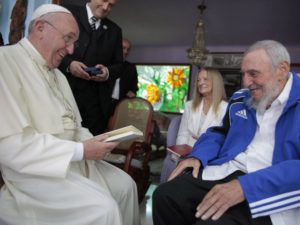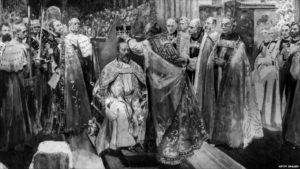 The New York Times:
The New York Times:
A few months ago, after a fertility procedure at a Mexican clinic, a healthy baby boy was born in New York to a couple from Jordan. It was the first live birth of a child who has been called — to the dismay of scientists who say the term is grossly misleading — a three-parent baby.
“This is huge,” said Dr. Richard J. Paulson, president-elect of the American Society for Reproductive Medicine, after the birth was reported on Tuesday.
The method used to help the couple is one that reproductive scientists have been itching to try, but it is enormously controversial because it uses genetic material from a donor in addition to that of the couple trying to conceive. The purpose is to overcome flaws in a parent’s mitochondria that can cause grave illnesses in babies.
And why exactly should this helpful procedure be ‘enormously controversial’?
Part of the answer lies in that term ‘three-parent baby’, rightly described as grossly misleading.
The New York Times:
Mitochondria, the cell’s energy factories, are separate from the DNA that determines a child’s inherited traits. But mutations in these little organelles can be devastating, resulting in fatal diseases involving the nerves, muscles, brain, heart, liver, skeletal muscles, kidney and the endocrine and respiratory systems that often kill babies in the first few years of life.
The technique that led to the healthy birth was to move the DNA from an egg of the mother, who had mutated mitochondria, and place it in the egg of a healthy egg donor — after first removing the healthy donor’s nuclear DNA from her egg cell. Then that egg, with its healthy mitochondria and the mother’s DNA, could be fertilized….
The Guardian:
A small number of children each year are born with faults in their mitochondrial DNA which can cause diseases. Mitochondria are small structures that sit inside our cells and provide them with energy. They have their own set of 37 genes which are separate from the 20,000 or so genes that shape who we are.
… On a genetic level, all of the 20,000 genes on the child’s 23 pairs of chromosomes come from the child’s mother and father. The donor only contributes DNA that sit in the mitochondria, less than 0.2% of the total.
The New York Times:
“Mitochondria,” Dr. Paulson said, “do not define who you are.” The genes for traits that make up a person’s appearance and other characteristics are carried in the nuclear DNA. If a white woman got mitochondria from an Asian woman, for example, her babies would be white, with no traces of the Asian mitochondrial donor. The ban, said Dr. Paulson, “is not scientific, not rational, not evidence-based.”
“Not rational”.
Enter religion.
The Guardian:
The Catholic church opposes one form of mitochondrial transfer, called pronuclear transfer, because a fertilised egg from the mother is destroyed in the process. Catholic ethicists have also complained that mitochondrial transfer introduces a “rupture” between mother and father and “dilutes parenthood”.
Roman Catholic objections to that first form of mitochondrial transfer are consistent with that church’s opposition to abortion, and in that sense are understandable.
But there is a second method, called mitochondrial spindle transfer (MST).
The Guardian explains:
In this, doctors use standard IVF procedures to collect eggs from the mother. They take the nucleus from one of the eggs and drop it into a healthy donor egg that has had its own nucleus removed. The reconstituted egg contains all the normal genes from the mother, but her faulty mitochondria are replaced by those from the healthy donor. The egg is then fertilised with the father’s sperm. The resulting embryo has the usual 23 pairs of chromosomes that hold the mother and father’s DNA, but the 37 mitochondrial genes, about 0.2% of the total, come from a third person, the donor.
So no fertilized egg is destroyed.
Problem! Enter those ‘Catholic ethicists’ talking about a “rupture” between mother and child as grounds for objecting to all types of mitochondrial transfer. Their evidence for this ‘rupture’ is what exactly?
Let’s not forget that this is a church that, when it’s not opining on the scientific basis for exorcism, is also a church that claims to be a scientific authority on climate change.
It is also a church that likes to proclaim its compassion.
The Guardian:
Mitochondrial diseases tend to strike in childhood and get steadily worse. They often prove fatal before adulthood. The parts of the body that need most energy are worst affected: the brain, muscles, heart and liver. Conditions include Leigh’s disease, progressive infantile poliodystrophy and Barth syndrome. Faulty mitochondria have also been linked to more common medical problems, including Parkinson’s, deafness, failing eyesight, epilepsy and diabetes…There are no cures for mitochondrial disorders.
The New York Times:
When Dr. Zhang [the doctor who led the team that carried out the procedure] told the Jordanian couple about the technique, they hesitated. They already had a child who was terribly ill with Leigh syndrome, a mitochondrial disease, but there was a chance they could have a normal baby on their own — a quarter of the woman’s mitochondria were mutated, but mitochondria are distributed at random in eggs. If an egg with mostly good mitochondria happened to be fertilized, the baby would be fine. They decided to take their chances.
The couple returned to Jordan and had a baby. But the baby had the same mitochondrial disease, Leigh syndrome. It is a terrible disease, Dr. Zhang said. Babies progressively lose their ability to move and breathe. The baby had a tracheotomy and a feeding tube, he said, and the parents had to suction the baby’s lungs every hour.
The first baby died at age 6; the second baby at 8 months.
And so far as the church is concerned, that’s sad, doubtless, but not something that can be helped.
The New York Times:
The couple returned to Dr. Zhang, ready to try the mitochondrial transfer technique. New Hope Fertility Center has a clinic in Mexico, so he suggested doing the procedure there because it is effectively banned in the United States. More than a decade ago, the Food and Drug Administration ordered clinics to file an application to do such work. Later, Congress attached a rider to a bill making it impossible to fund such research.
By six months of pregnancy, the woman said she knew this baby was different. It kicked constantly — the others, affected even in the womb, had hardly moved. Now the boy is 5 months old and healthy, and has normal mitochondria. The birth was first reported on Tuesday by New Scientist magazine.
Reproductive scientists who have been frustrated by the ban were both gratified by Dr. Zhang’s success and angry that it took so long. Britain recently allowed research on mitochondrial transfers to proceed, but nothing has changed in the United States.
Shameful.
 This blog began in the fall of 2008 somewhat on a lark. This was during a period when the American Right was beholden in many ways to the Religious Right. By “many ways,” I mean more in symbolics and rhetoric than reality. The reality is that conservatism in the 2000s was a “three legged stool” where the Religious Right was fed rhetorical “red meat,” while the neocons were ascendant and the economic conservatives achieved some gains (and losses).
This blog began in the fall of 2008 somewhat on a lark. This was during a period when the American Right was beholden in many ways to the Religious Right. By “many ways,” I mean more in symbolics and rhetoric than reality. The reality is that conservatism in the 2000s was a “three legged stool” where the Religious Right was fed rhetorical “red meat,” while the neocons were ascendant and the economic conservatives achieved some gains (and losses).
 To Pope Francis, Castro’s death was “sad”
To Pope Francis, Castro’s death was “sad” 
 Writing in
Writing in 
 Over
Over Whether or not God exists there cannot be much doubt about the existence of (to use a crude shorthand) a ‘God gene’, the innate propensity of most people to believe in gods and/or the supernatural and, at least to a degree, to base their behavior on those beliefs.
Whether or not God exists there cannot be much doubt about the existence of (to use a crude shorthand) a ‘God gene’, the innate propensity of most people to believe in gods and/or the supernatural and, at least to a degree, to base their behavior on those beliefs. The New York Times:
The New York Times: The Daily Telegraph:
The Daily Telegraph: Crux:
Crux: